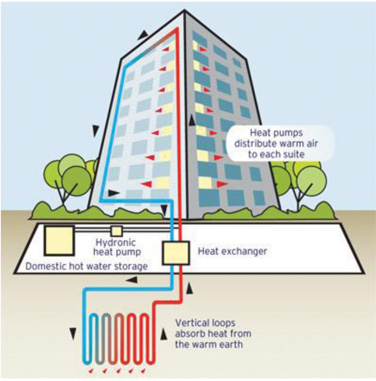British Columbia School District Gets Down to Earth
 SURREY, B.C. — The Delta School District in British Columbia (BC), Canada recently broke ground on a system that will deliver thermal energy to 19 buildings, saving the district approximately $180,000 per year when the work is completed in 2014. The $6.4 million project is mostly being funded by FortisBC, the largest utility company in British Columbia, which will also design and install the system. The school also received a $1.4 million grant through the Public Sector Energy Conservation Agreement (PSECA). The conservation agreement involves a collaboration between the BC government and three major energy companies, with each partner contributing funding to a pool for investments in renewable energy sources and green technologies. BC Hydro became the first non-governmental partner when the program was launched in 2007. FortisBC, known as Terasen Gas at the time, and SolarBC have become partners more recently.
SURREY, B.C. — The Delta School District in British Columbia (BC), Canada recently broke ground on a system that will deliver thermal energy to 19 buildings, saving the district approximately $180,000 per year when the work is completed in 2014. The $6.4 million project is mostly being funded by FortisBC, the largest utility company in British Columbia, which will also design and install the system. The school also received a $1.4 million grant through the Public Sector Energy Conservation Agreement (PSECA). The conservation agreement involves a collaboration between the BC government and three major energy companies, with each partner contributing funding to a pool for investments in renewable energy sources and green technologies. BC Hydro became the first non-governmental partner when the program was launched in 2007. FortisBC, known as Terasen Gas at the time, and SolarBC have become partners more recently.
The new heating and cooling system will use geoexchange technology and high efficiency natural gas boilers to cut the district’s energy bills. Geoexchange temperature management works by running water into the ground and relies on the difference in temperature between the ground and the air. During the cold winter months, underground pipes are warmer than the outside air, meaning the water can be used to heat air before it is moved throughout the building. During the warm summer months, the relatively cooler subterranean temperatures can be transferred into the building instead.
The project will go a long way in terms of preserving Canada’s natural gas resources. The change to a geoexchange system will result in a 45-percent decrease in energy use, saving the equivalent of enough natural gas to heat over 360 homes per year. The move will also significantly lower the districts greenhouse gas emissions. The change represents a 69-percent drop in emissions, the equivalent of taking 450 cars off the road per year.
The system will save the district a lot of money, especially because the Province of British Columbia requires all public sector organizations to achieve carbon neutrality, meaning they cannot contribute to global warming by emitting greenhouse gasses. Facilities that do not have their own clean energy sources must purchase carbon offsets, which basically consists of contributing funds to an organization that plants trees in the rainforest or does something else to combat the effects of global warming. The school currently purchases approximately $100,000 in carbon offsets each year. Combining this with the energy savings themselves, the district anticipates savings in excess of $180,000 per year.
Frank Geyer, director of facilities and planning at the school district, explained the project would be accompanied by a series of upgrades, rounding out the effort to increase fuel facilities.
He explained, “Facilities are being constructed, renovated and retrofitted with energy conservation in mind, including solar hot water systems and state-of-the-art energy consumption monitoring. A number of other initiatives have also been implemented to do our part in making our operations more efficient.”
